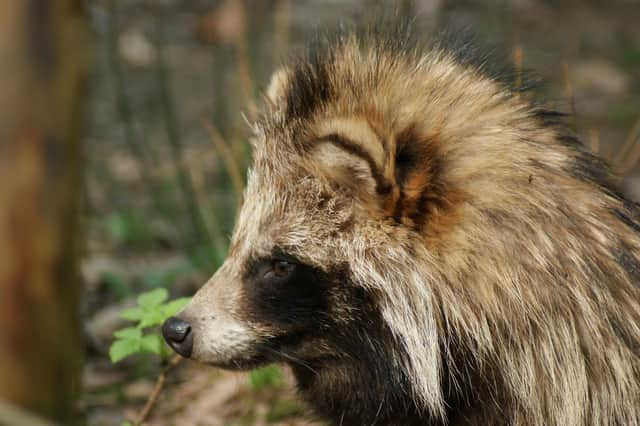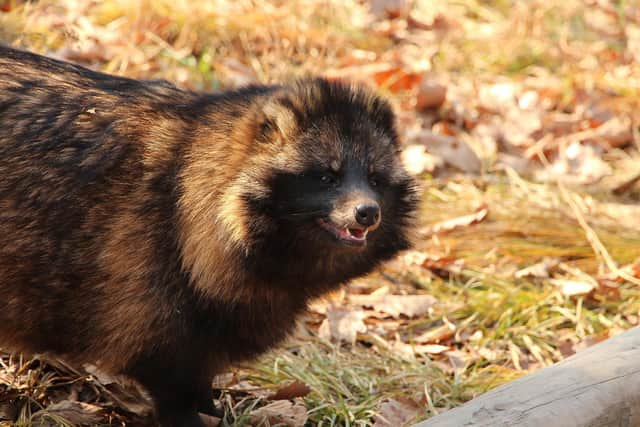UK's next non-native pests: What are raccoon dogs, why are they on the country's 'invasive species' list and why are they so stinky?


The raccoon dog has made a list of 20 invasive species likely to reach the UK and destroy native wildlife or bring disease.
With peculiar folklore, questionable scents and escapee tendencies there is much to be learnt about the fluffy species likely to threaten biodiversity in the UK in the years ahead.
What are raccoon dogs?


Advertisement
Hide AdAdvertisement
Hide AdRaccoon dogs, also known as the mangut, tanuki or neogurian, are exotic members of the fox family that is native to Japan, China and Siberia.
Despite its name, a raccoon dog, or – to give it its Latin name – a Nyctereutes procyonoides, is neither a raccoon nor a dog.
It belongs to the canid family, which is a lineage that includes dogs, wolves, and foxes.
They are mainly found in forests, wetlands, farmlands, and urban areas.
These omnivores have a habit of regularly climbing trees and feed on insects, rodents, amphibians, birds, fish, reptiles, mollusks, carrion as well as fruits, nuts, and berries.
They are known to be monogamous, however, captive males have been known to mate with four or five females.
The animal has been significant in Japanese folklore since ancient times.
The legendary tanuki is reputed to be mischievous and jolly, a master of disguise and shapeshifting but also gullible and absentminded.
Advertisement
Hide AdAdvertisement
Hide AdThey are also a common theme in Japanese art, especially statuary.
According to folklore, it is said the raccoon dogs shapeshift by rubbing their testicles and creating them into the shape they desire.
Countries the raccoon dog has escaped to?
Raccoon dogs were introduced into the old Soviet Union in the mid-20th century, including in Baltic states such as Latvia.
Much like folklore- with the exception of metamorphic testicles- raccoon dogs in real life are renowned as the escapologists of the mammal world.
Known to have been farmed for fur, raccoon dogs escaped and spread rapidly through continental Europe in recent years, particularly in countries in northern European such as Finland, Sweden and Denmark.
They have also been sighted in France, Germany, Poland and the Netherlands.
The animals have been kept in Britain as exotic pets but since 2019 it has been illegal to buy or sell one.
In 2019, a raccoon dog was seen walking the streets of Greenock in Scotland with many spotting the sneaky furball in their back gardens.
Advertisement
Hide AdAdvertisement
Hide AdA wild raccoon dog was captured and killed in Wales last year.
Why are they a threat to the UK?
A horizon scanning study reported in the Guardian found that the raccoon dog and the raccoon are the only mammals on a list of 20 invasive species likely to reach the UK and destroy native wildlife or bring disease.
The study which shows early signs of potentially important developments was funded by the Department of Environment, Food and Rural Affairs.
Invasive non native species are one of the major threats to biodiversity in the UK.
While most non-native species cause few problems, between 10% and 15% are classified as problematic in Britain because they threaten native wildlife or bring disease.
According to the government, invasive non-native species including Japanese knotweed and the Asian hornet cost the economy £1.8bn each year.
Why are they a pest?
According to the Mammal Society, the omnivorous species could pose a threat to rare native species including amphibians, small mammals and ground-nesting birds in the UK.
Raccoon dogs can also transmit a number of diseases.
Advertisement
Hide AdAdvertisement
Hide AdDr Stephanie Wray, the chair of the Mammal Society, said: “The raccoon dog is a very adaptable animal which can breed quickly and survive on a wide range of food.
“We need to be mindful of their potential impact on our native species and report any such sightings as soon as possible.
“You only have to look at the decimation of water vole numbers, which were already struggling with habitat loss before predation by invasive American mink, to see the damage which can be done over a relatively short period of time.”
What makes them so smelly?
According to the RSPCA, the raccoon dog is an “extremely smelly” animal and they strongly advise against having one as a house pet.
The reason for this is because they use scent to communicate with one another meaning they are constantly giving off smells through their own gases to strike up conversation.
Unlike dogs, they don’t wag their tails, but they use their olfactory senses to sniff for food and mates.
Should I have a raccoon dog as a pet?
A raccoon dog is not suited to life as a pet in a domestic environment.
The SSPCA and the RSPCA strongly discourage people from buying or keeping one as a pet.
Advertisement
Hide AdAdvertisement
Hide AdThey are wild animals which need a great deal of space and their needs cannot be met in a typical household.
In the wild, raccoon dogs have large home ranges and so it would be unsuitable to keep this particular animal in an enclosure that doesn't provide the space and complexity of environment they require to carry out their normal behaviour.
A RSPCA spokesperson said: “Sadly, it's not uncommon to see 'pet' raccoon dogs kept in a house, in a small enclosure in a garden or in a small enclosure in a pet shop. All environments that are totally unsuitable for a raccoon dog's complex needs.”
A message from the Editor:Thank you for reading this article. We're more reliant on your support than ever as the shift in consumer habits brought about by Coronavirus impacts our advertisers.
If you haven't already, please consider supporting our trusted, fact-checked journalism by taking out a digital subscription.
Comments
Want to join the conversation? Please or to comment on this article.
